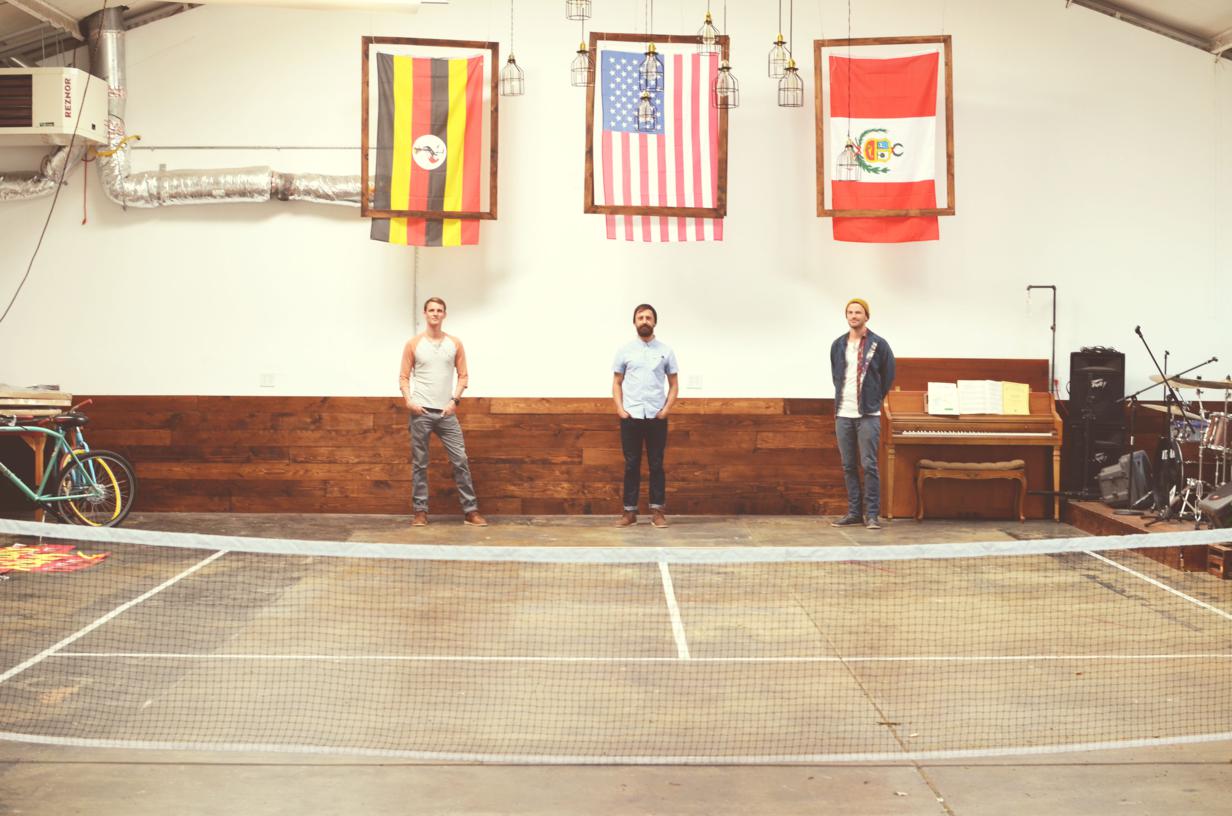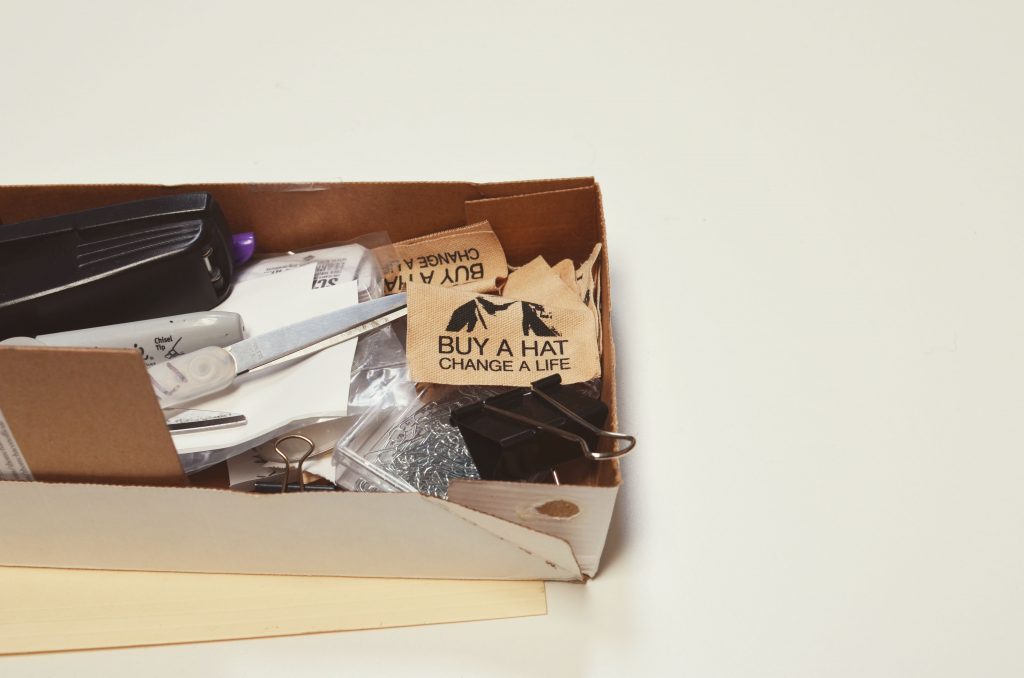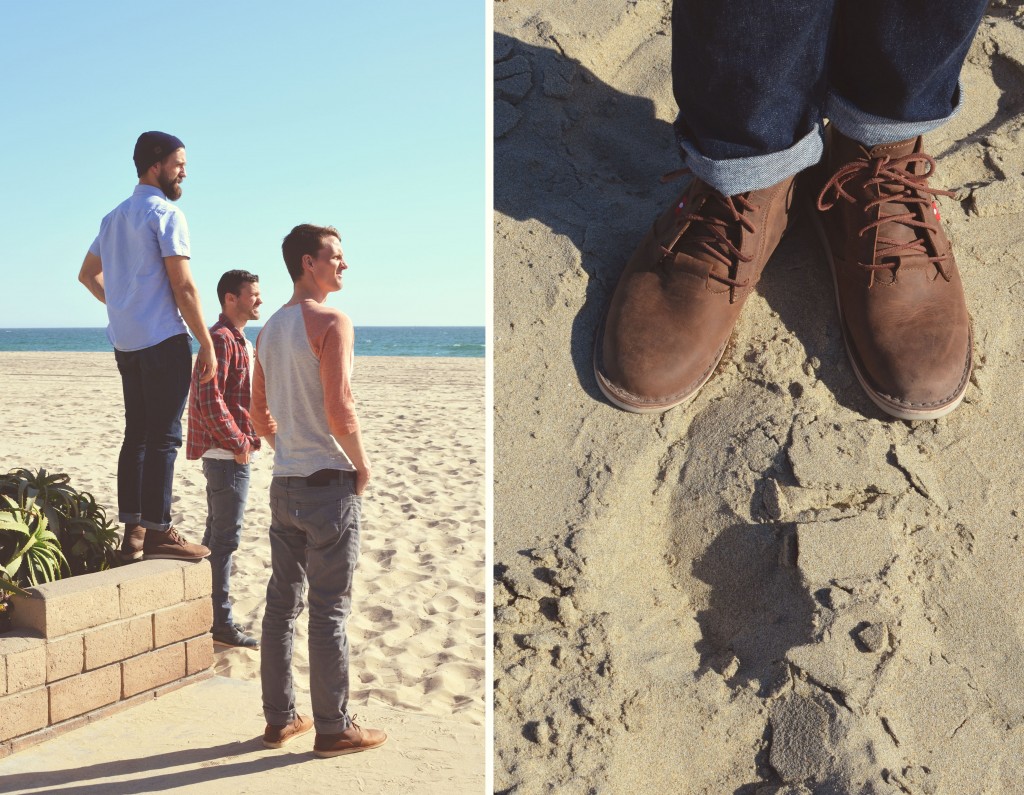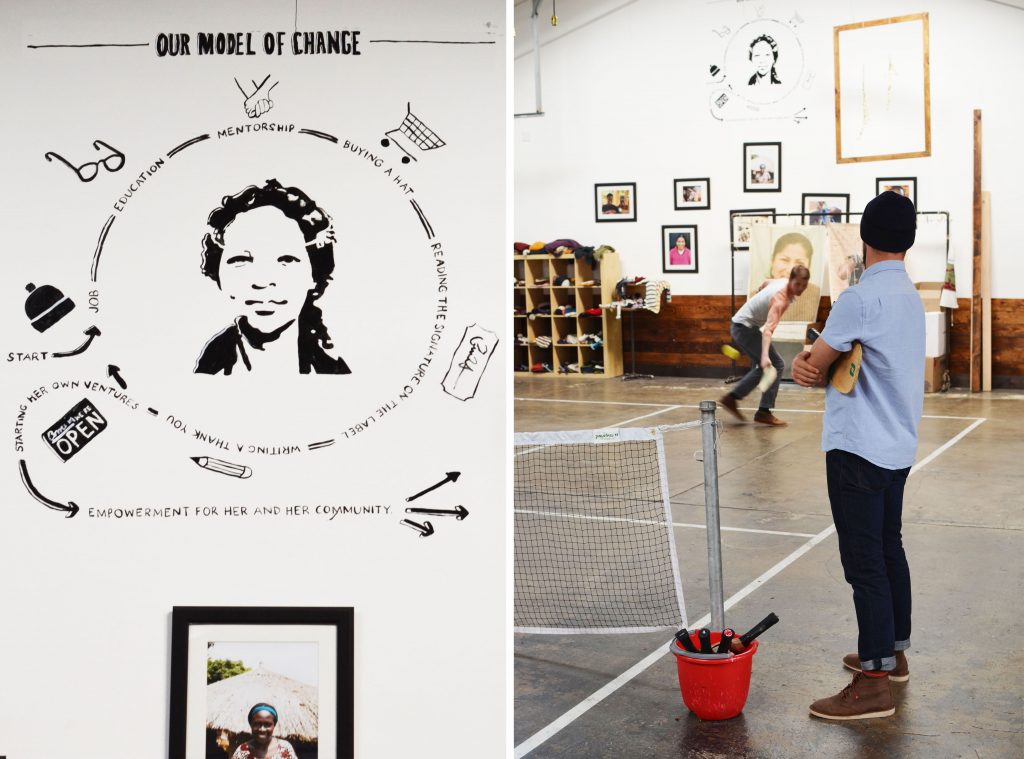
At Oliberté, we believe that the only way to continually bring pride and prosperity in Africa is if it is a joint effort by several persons, brands and partners. “Ambassadors” features subjects who are directly or indirectly working with non-profit or social good organizations or those who exemplify a passion for Africa and its citizens.
Kohl Crecelius, Stewart Ramsey, and Travis Hartanov are the founders of Krochet Kids international, a non-profit that sells awesome hats and goods made in Uganda and Peru. KKi is based out of Costa Mesa, California, and is going on six years of increasing success. They currently employ 150 women in Uganda and 30 women in Peru, pairing work with mentorship and education to build sustainable opportunities and investment in local communities.
 So how did you guys get the idea for KKi?
Kohl:
So how did you guys get the idea for KKi?
Kohl: The three of us are friends from Spokane, Washington, which is where we grew up. In high school, my older brother taught me how to crochet, then I taught these guys, and we started making beanies for fun. And we got the idea to sell them. It was the coolest thing in the world to us, and we dubbed ourselves the Krochet Kids. Then we went to different colleges and found ourselves traveling. And a big part of our travels were in developing countries volunteering with organizations, really just trying to get an understanding of what it meant to live in poverty.
Stewart went to Uganda and came to understand the situation that had been unfolding there the last 20 years, civil war, people essentially becoming refugees in their own country. And so he became our voice there, just asking people what they needed. And they said they wanted to work, they wanted to provide for themselves. We didn’t know how to do much. Literally, one thing we knew how to do was crochet. So we decided we were going to apply to be a non-profit and go back the following summer with a group and train people how to crochet. It would be an extension of high school, but it would be Krochet Kids International, and it would offer people the empowerment and opportunity to take care of themselves and think about what’s next for their future.

 What is the biggest benefit you have seen so far?
Stewart:
What is the biggest benefit you have seen so far?
Stewart: Most recently, one of the first ladies we trained, Beatrice, came to us and was like, “Hey, I can’t crochet anymore.” Because of those business trainings, learning about saving and loans, and having that income, she was able to do three different things: She started her own wholesale business selling rice and beans and stuff to her local villages. Then she was able to take a loan out and hire her husband to be a motorcycle taxi driver. Then, most recently, she has been able to purchase land, which she farms and leases out plot rows. She is selling her own produce from that as well. After five years, for her to be leaving the nest … It’s kind of what we’ve been dreaming about for a long time.
 What the biggest challenge you face regularly?
Kohl:
What the biggest challenge you face regularly?
Kohl: One of the big challenges I come up against a lot is the depth of what we do is hard for people to understand … People want a simple solution, like, “I buy something, and it gives something away,” or “I buy something and it gives money somewhere.” We see part of our role as educating people on how good development happens. How you do really fully empower someone and not just put a band-aid on?
How did you guys decide on Peru?
Travis: We’ve always wanted to not be huge in one area, at least have a couple locations to be able to diversify products and also to shed light on different stories. Coming from the productions and operations perspective, Peru has alpaca, it’s the biggest exporter of alpaca ever, and we knew there was a lot of good natural resources like yarn. Knitting was already a part of the culture there too.
 What is one of the most common misconceptions you think people have about developing countries?
Kohl:
What is one of the most common misconceptions you think people have about developing countries?
Kohl: Misconceptions around poverty; why people are poor and the capabilities of people that live in developing countries. We believe, and through our work we’ve learned, that given opportunities, people are very capable and surprise you with what they can accomplish for themselves and for their families.
Stewart: In that sense too, that idea that people are people. We’re not that different from one another. Yes we have different cultures, and yes we eat different foods and stuff. But for the most part, if you go to Uganda, there’s amazingly happy people, and there’s sad people, and there’s crooks. Everything that is represented everywhere else is also represented there, so to think that it’s a seemingly other world or that they’re incapable or think so backwards or different … all of those population groups or types of people are more or less represented.
 On a completely different note … why pickleball?
All three, finishing each-others’ sentences:
On a completely different note … why pickleball?
All three, finishing each-others’ sentences: We got this space, and said we had to have a pickleball court. Pickleball was created in Seattle, we played it in racket sports in high school. And I think overall, the work-life balance is big for us: Work hard, play hard. That’s another misconception of non-profit work in general — in people’s minds, there are these two buckets or categories: I’m having fun or I’m helping people. And they do one or the other. We’re trying to break that mold on all of that. How do you integrate loving and caring for people into your work, into your play? The more that you can merge those things, the more happy and balanced you will be as a person. And, it’s more fun to play pickleball than it is to not play pickleball.
What’s something we can expect to see from KKi shortly?
Kohl: We are giving our apparel more attention and it is really exciting for a couple of reasons: Everything will be made and signed by one of our ladies in Peru. And then we have created our own custom fits that you will love.


 So how did you guys get the idea for KKi?
Kohl: The three of us are friends from Spokane, Washington, which is where we grew up. In high school, my older brother taught me how to crochet, then I taught these guys, and we started making beanies for fun. And we got the idea to sell them. It was the coolest thing in the world to us, and we dubbed ourselves the Krochet Kids. Then we went to different colleges and found ourselves traveling. And a big part of our travels were in developing countries volunteering with organizations, really just trying to get an understanding of what it meant to live in poverty.
Stewart went to Uganda and came to understand the situation that had been unfolding there the last 20 years, civil war, people essentially becoming refugees in their own country. And so he became our voice there, just asking people what they needed. And they said they wanted to work, they wanted to provide for themselves. We didn’t know how to do much. Literally, one thing we knew how to do was crochet. So we decided we were going to apply to be a non-profit and go back the following summer with a group and train people how to crochet. It would be an extension of high school, but it would be Krochet Kids International, and it would offer people the empowerment and opportunity to take care of themselves and think about what’s next for their future.
So how did you guys get the idea for KKi?
Kohl: The three of us are friends from Spokane, Washington, which is where we grew up. In high school, my older brother taught me how to crochet, then I taught these guys, and we started making beanies for fun. And we got the idea to sell them. It was the coolest thing in the world to us, and we dubbed ourselves the Krochet Kids. Then we went to different colleges and found ourselves traveling. And a big part of our travels were in developing countries volunteering with organizations, really just trying to get an understanding of what it meant to live in poverty.
Stewart went to Uganda and came to understand the situation that had been unfolding there the last 20 years, civil war, people essentially becoming refugees in their own country. And so he became our voice there, just asking people what they needed. And they said they wanted to work, they wanted to provide for themselves. We didn’t know how to do much. Literally, one thing we knew how to do was crochet. So we decided we were going to apply to be a non-profit and go back the following summer with a group and train people how to crochet. It would be an extension of high school, but it would be Krochet Kids International, and it would offer people the empowerment and opportunity to take care of themselves and think about what’s next for their future.

 What is the biggest benefit you have seen so far?
Stewart: Most recently, one of the first ladies we trained, Beatrice, came to us and was like, “Hey, I can’t crochet anymore.” Because of those business trainings, learning about saving and loans, and having that income, she was able to do three different things: She started her own wholesale business selling rice and beans and stuff to her local villages. Then she was able to take a loan out and hire her husband to be a motorcycle taxi driver. Then, most recently, she has been able to purchase land, which she farms and leases out plot rows. She is selling her own produce from that as well. After five years, for her to be leaving the nest … It’s kind of what we’ve been dreaming about for a long time.
What is the biggest benefit you have seen so far?
Stewart: Most recently, one of the first ladies we trained, Beatrice, came to us and was like, “Hey, I can’t crochet anymore.” Because of those business trainings, learning about saving and loans, and having that income, she was able to do three different things: She started her own wholesale business selling rice and beans and stuff to her local villages. Then she was able to take a loan out and hire her husband to be a motorcycle taxi driver. Then, most recently, she has been able to purchase land, which she farms and leases out plot rows. She is selling her own produce from that as well. After five years, for her to be leaving the nest … It’s kind of what we’ve been dreaming about for a long time.
 What the biggest challenge you face regularly?
Kohl: One of the big challenges I come up against a lot is the depth of what we do is hard for people to understand … People want a simple solution, like, “I buy something, and it gives something away,” or “I buy something and it gives money somewhere.” We see part of our role as educating people on how good development happens. How you do really fully empower someone and not just put a band-aid on?
How did you guys decide on Peru?
Travis: We’ve always wanted to not be huge in one area, at least have a couple locations to be able to diversify products and also to shed light on different stories. Coming from the productions and operations perspective, Peru has alpaca, it’s the biggest exporter of alpaca ever, and we knew there was a lot of good natural resources like yarn. Knitting was already a part of the culture there too.
What the biggest challenge you face regularly?
Kohl: One of the big challenges I come up against a lot is the depth of what we do is hard for people to understand … People want a simple solution, like, “I buy something, and it gives something away,” or “I buy something and it gives money somewhere.” We see part of our role as educating people on how good development happens. How you do really fully empower someone and not just put a band-aid on?
How did you guys decide on Peru?
Travis: We’ve always wanted to not be huge in one area, at least have a couple locations to be able to diversify products and also to shed light on different stories. Coming from the productions and operations perspective, Peru has alpaca, it’s the biggest exporter of alpaca ever, and we knew there was a lot of good natural resources like yarn. Knitting was already a part of the culture there too.
 What is one of the most common misconceptions you think people have about developing countries?
Kohl: Misconceptions around poverty; why people are poor and the capabilities of people that live in developing countries. We believe, and through our work we’ve learned, that given opportunities, people are very capable and surprise you with what they can accomplish for themselves and for their families.
Stewart: In that sense too, that idea that people are people. We’re not that different from one another. Yes we have different cultures, and yes we eat different foods and stuff. But for the most part, if you go to Uganda, there’s amazingly happy people, and there’s sad people, and there’s crooks. Everything that is represented everywhere else is also represented there, so to think that it’s a seemingly other world or that they’re incapable or think so backwards or different … all of those population groups or types of people are more or less represented.
What is one of the most common misconceptions you think people have about developing countries?
Kohl: Misconceptions around poverty; why people are poor and the capabilities of people that live in developing countries. We believe, and through our work we’ve learned, that given opportunities, people are very capable and surprise you with what they can accomplish for themselves and for their families.
Stewart: In that sense too, that idea that people are people. We’re not that different from one another. Yes we have different cultures, and yes we eat different foods and stuff. But for the most part, if you go to Uganda, there’s amazingly happy people, and there’s sad people, and there’s crooks. Everything that is represented everywhere else is also represented there, so to think that it’s a seemingly other world or that they’re incapable or think so backwards or different … all of those population groups or types of people are more or less represented.
 On a completely different note … why pickleball?
All three, finishing each-others’ sentences: We got this space, and said we had to have a pickleball court. Pickleball was created in Seattle, we played it in racket sports in high school. And I think overall, the work-life balance is big for us: Work hard, play hard. That’s another misconception of non-profit work in general — in people’s minds, there are these two buckets or categories: I’m having fun or I’m helping people. And they do one or the other. We’re trying to break that mold on all of that. How do you integrate loving and caring for people into your work, into your play? The more that you can merge those things, the more happy and balanced you will be as a person. And, it’s more fun to play pickleball than it is to not play pickleball.
What’s something we can expect to see from KKi shortly?
Kohl: We are giving our apparel more attention and it is really exciting for a couple of reasons: Everything will be made and signed by one of our ladies in Peru. And then we have created our own custom fits that you will love.
On a completely different note … why pickleball?
All three, finishing each-others’ sentences: We got this space, and said we had to have a pickleball court. Pickleball was created in Seattle, we played it in racket sports in high school. And I think overall, the work-life balance is big for us: Work hard, play hard. That’s another misconception of non-profit work in general — in people’s minds, there are these two buckets or categories: I’m having fun or I’m helping people. And they do one or the other. We’re trying to break that mold on all of that. How do you integrate loving and caring for people into your work, into your play? The more that you can merge those things, the more happy and balanced you will be as a person. And, it’s more fun to play pickleball than it is to not play pickleball.
What’s something we can expect to see from KKi shortly?
Kohl: We are giving our apparel more attention and it is really exciting for a couple of reasons: Everything will be made and signed by one of our ladies in Peru. And then we have created our own custom fits that you will love.







